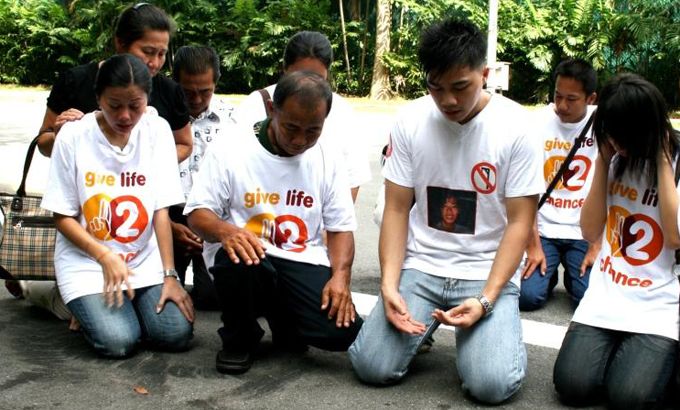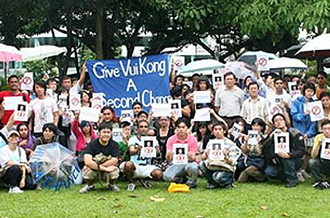
Yong’s Story
The case of a young Malaysian convicted for drug trafficking tests Singapore’s capital punishment laws.
In Singapore anyone caught with more than 15 grams of heroin faces a mandatory death penalty. No extenuating circumstances can be taken into account by the legal system and this, argues the UN special rapporteur, is a violation of human rights.
Now, the conviction of one young Malaysian man, Yong Vui Kong, sentenced to death after being found guilty of heroin trafficking, is forcing Singaporean courts to re-examine the law. Madasamy Ravi, Yong’s lawyer, is fighting to make legal history as he takes Yong’s story to the Court of Appeal.
Already his client’s death has been postponed twice. Meanwhile Yong’s brother, Yun Leong, is preparing the family for the possibility that Yong will hang. As Yong languished on death row in Singapore’s notorious Changi Prison, filmmakers Lynn Lee and James Leong spent time with his family and legal team, watching the unfolding case of Yong Vui Kong.
In the following account Lynn Lee shares her views on Yong’s story.
At first it was just a name. Yong Vui Kong. We first heard it in 2009, at a forum on the death penalty in Singapore. Yong Vui Kong. We were told he was a convicted drug mule from east Malaysia. He had been caught with more than 15 grams of heroin. He would most likely hang before the year was up. We shook our heads, made sympathetic noises. But really, it was just a name.
And then we saw him in person. A skinny kid in an oversized orange jumpsuit seated behind a glass enclosure, surrounded by prison guards. And the awfulness of his situation hit home.
| JOIN THE DEBATE |
|
|
This kid was going to die for a crime committed when he was just 19. He looked so helpless, frail almost, inside the sterile courtroom. It was hard not to feel sorry for him.
We were told he had converted to Buddhism, had vowed to be good. We were told he was holding out hope for a second chance. It was hard not to root for him.
Over the months, as Vui Kong’s lawyer obtained one stay of execution after another, tens of thousands of people rallied to his cause. These were supporters who had never even seen him in person. They went out in force, collecting signatures in support of a petition for a second chance for the kid. They blogged, made banners, composed songs, organised protests and sent hundreds of messages to his family members. They amazed us with their commitment and energy.
But why? Why this particular death row inmate and not anyone else? Singapore regularly hangs people for drug trafficking. So what makes Yong Vui Kong so special?
Perhaps it is his personal story, the awfulness of his past. He grew up in extreme poverty, dropped out of school when he was just 11. He was barely literate when he was caught – a lowly cog in a shadowy syndicate. He was so very young. He is so very sorry now.
 |
It is hard to overstate the significance of Yong Vui Kong’s case. It has forced many in Singapore to think about the fairness of the mandatory death sentence.
The government has vigorously defended its stance, with the law minister himself questioning the cost of letting a drug mule like Vui Kong go. The Court of Appeal here has also held that the mandatory death sentence is not unconstitutional.
But still, the debate rages on, and we suspect, it will do so for some time to come.
In the meantime, the family continues to hold on to hope. No one expected in 2009, when Vui Kong’s lawyer first walked into court requesting a stay of execution, that the kid would still be alive today in January 2011. But he is. And the story has drawn more attention than anyone thought possible. One of the reasons could be because of the numerous complex legal issues that the case has thrown up.
As Vui Kong’s lawyer puts it, the battle is far from over. The judges have yet to release their decision on the latest challenge – a request for a judicial review of the law minister’s statements and the president’s powers.
For the family, it must be nerve-wracking, this ding-donging between hope and despair. Onlookers like us will perhaps never understand their anguish. But should the kid die, we too would be devastated. We would grieve not in the way the family would grieve. We would grieve because of what killing someone like Yong Vui Kong says about us, about the country we live in, about what we are willing to sacrifice, in exchange for our sense of security.
For more information about Yong Vui Kong read Lynn’s blog.
Yong’s Story can be seen from Tuesday, January 25, at the following times GMT: Tuesday: 2230; Wednesday: 0930; Thursday: 0330; Friday: 1630; Saturday: 2230; Sunday: 0930; Monday: 0330; Tuesday: 1630.


